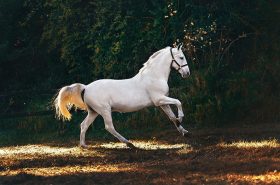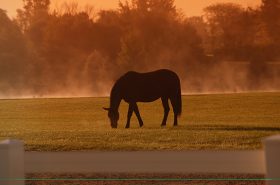It is important to keep your horse’s dental health current and April is the optimal time to schedule that appointment. It should be done yearly at a minimum, and between their vaccinations in March and deworming in May, April is a great month to think about their dental health!
You may have even heard your veterinarian refer to horse’s teeth needed to be floated, but what exactly does that mean?
Teeth floating is the removal of sharp points from the cheek side of the horses’ upper teeth and from the tongue side of the lower teeth. Horse teeth are in two main categories: incisors and the cheek teeth. Incisors are those big beautiful front teeth that show when your horse gives you a goofy smile and the cheek teeth are located on the sides of their mouths. The incisors tear their grass and foliage from the ground while the cheek teeth grind the food.
Why do horses need their teeth floated?
They need their teeth floated because horses chew in a circular motion and that leads to uneven wear on the teeth and sharp points will eventually form. The sharp points will then become painful and can cause bigger issues for your horse.
What issues can arise if you don’t get your horse’s teeth floated?
- Difficulty in chewing, with food dropping from the mouth
- Loss of weight
- Not wanting to have the face or muzzle handled
- Resisting having the bridle put on
- Head tossing and difficult handling when riding
- Facial swelling
These are just a few of the most common signs that your horse’s teeth need to be floated.
If you haven’t already given your veterinarian or equine dentist a call, do so now and get an evaluation scheduled. I love hearing from all of you so please feel free to drop a comment below or reach out to me on my personal Instagram at @unbridledmama.
Love this blog post? We think you will like TMJ Disorder in Horses



